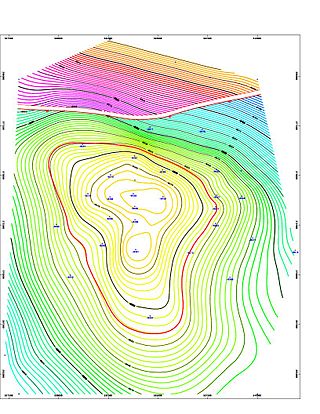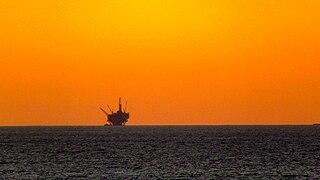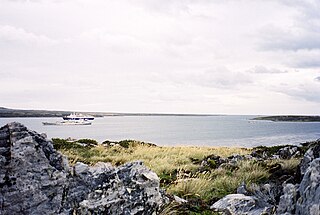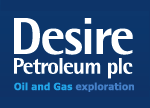The economy of the Falkland Islands, which first involved sealing, whaling and provisioning ships, became heavily dependent on sheep farming from the 1870s to 1980. It then diversified and now has income from tourism, commercial fishing, and servicing the fishing industry as well as agriculture. The Falkland Islands use the Falkland pound, which is backed by the British pound.

An oil platform is a large structure with facilities to extract and process petroleum and natural gas that lie in rock formations beneath the seabed. Many oil platforms will also have facilities to accommodate the workers, although it is also common to have a separate accommodation platform bridge linked to the production platform. Most commonly, oil platforms engage in activities on the continental shelf, though they can also be used in lakes, inshore waters, and inland seas. Depending on the circumstances, the platform may be fixed to the ocean floor, consist of an artificial island, or float. In some arrangements the main facility may have storage facilities for the processed oil. Remote subsea wells may also be connected to a platform by flow lines and by umbilical connections. These sub-sea facilities may include one or more subsea wells or manifold centres for multiple wells.

An oil well is a drillhole boring in Earth that is designed to bring petroleum oil hydrocarbons to the surface. Usually some natural gas is released as associated petroleum gas along with the oil. A well that is designed to produce only gas may be termed a gas well. Wells are created by drilling down into an oil or gas reserve that is then mounted with an extraction device such as a pumpjack which allows extraction from the reserve. Creating the wells can be an expensive process, costing at least hundreds of thousands of dollars, and costing much more when in hard to reach areas, e.g., when creating offshore oil platforms. The process of modern drilling for wells first started in the 19th century, but was made more efficient with advances to oil drilling rigs during the 20th century.

The Straits of Florida, Florida Straits, or Florida Strait is a strait located south-southeast of the North American mainland, generally accepted to be between the Gulf of Mexico and the Atlantic Ocean, and between the Florida Keys (U.S.) and Cuba. It is 93 mi (150 km) wide at the narrowest point between Key West and the Cuban shore, and has been sounded to a depth of 6,000 feet (1,800 m). The strait carries the Florida Current, the beginning of the Gulf Stream, from the Gulf of Mexico.

The Castle class was a class of British offshore patrol vessels of the Royal Navy. Two ships were constructed and after nearly 30 years service were sold to the Bangladesh Navy in 2010. The Bangladesh Navy upgraded these with more armaments including C-704 anti-ship missiles and sensors. These ships are now reclassified as corvettes by the Bangladesh Navy.

North Sea oil is a mixture of hydrocarbons, comprising liquid petroleum and natural gas, produced from petroleum reservoirs beneath the North Sea.

Port Stanley Airport is an airport in the Falkland Islands, two miles outside the capital, Stanley. The airport is the only civilian airport in the islands with a paved runway. However, RAF Mount Pleasant, located to the west of Stanley, functions as the islands' main international airport, because it has a long runway and allows civilian flights. Port Stanley Airport is operated by the Government of the Falkland Islands, and is used for internal flights between the islands and flights between the Falklands and Antarctica.

The geology of the Falkland Islands is described in several publications. The Falkland Islands are located on a projection of the Patagonian continental shelf. In ancient geological time this shelf was part of Gondwana, which around 400 million years ago broke from what is now Africa and drifted westwards relative to Africa. Studies of the seabed surrounding the islands indicated the possibility of oil. Intensive exploration began in 1996, although there had been some earlier seismic surveys in the region.

A petroleum reservoir or oil and gas reservoir is a subsurface accumulation of hydrocarbons contained in porous or fractured rock formations.
Premier Oil plc was an independent UK oil company with gas and oil interests in the United Kingdom, Asia, Africa and Mexico. It was devoted entirely to the 'upstream' sector of the industry — the exploitation of oil and gas — as opposed to the 'downstream' refining and retail sector. It was listed on the London Stock Exchange until it was acquired by Chrysaor Holdings and then merged into Harbour Energy in March 2021.

Offshore drilling is a mechanical process where a wellbore is drilled below the seabed. It is typically carried out in order to explore for and subsequently extract petroleum that lies in rock formations beneath the seabed. Most commonly, the term is used to describe drilling activities on the continental shelf, though the term can also be applied to drilling in lakes, inshore waters and inland seas.

Port William is a large inlet on the east coast of East Falkland island. A strait called "the Narrows" leads into Stanley Harbour.
Bristow Helicopters Limited is a British civil helicopter operator originally based at Aberdeen Airport, Scotland, which is currently a part of the U.S.-based Bristow Group which in turn has its corporate headquarters in Houston, Texas, U.S. In 2020, Bristow Group was merged with Era Helicopters, a large U.S.-based commercial helicopter operator that was previously a division of Era Aviation, with the two companies then continuing to use the Bristow name.
Noble Energy, Inc. was a company engaged in hydrocarbon exploration headquartered in Houston, Texas. In October 2020, the company was acquired by Chevron Corporation.
In petroleum geology, source rock is rock which has generated hydrocarbons or which could generate hydrocarbons. Source rocks are one of the necessary elements of a working petroleum system. They are organic-rich sediments that may have been deposited in a variety of environments including deep water marine, lacustrine and deltaic. Oil shale can be regarded as an organic-rich but immature source rock from which little or no oil has been generated and expelled. Subsurface source rock mapping methodologies make it possible to identify likely zones of petroleum occurrence in sedimentary basins as well as shale gas plays.

Offshore oil and gas in the Gulf of Mexico is a major source of oil and natural gas in the United States. The western and central Gulf of Mexico, which includes offshore Texas, Louisiana, Mississippi, and Alabama, is one of the major petroleum-producing areas of the United States. Oil production from US federal waters in the Gulf of Mexico reached an all-time annual high of 1.65 million barrels per day in 2017. Oil production is expected to continue the upward trend in 2018 and 2019, based on ten new oil fields which are planned to start production in those years. According to the Energy Information Administration, "Gulf of Mexico federal offshore oil production accounts for 15% of total U.S. crude oil production and federal offshore natural gas production in the Gulf accounts for 5% of total U.S. dry production."

Desire Petroleum plc was an oil and gas exploration company headquartered in Malvern, England. It owned offshore exploration and production licences in the North Falkland Basin in the waters north of the Falkland Islands and its core focus was to develop the basin into a major new hydrocarbon province.

Falkland Oil and Gas Ltd, abbreviated to FOGL, was an energy company registered in the Falkland Islands and headquartered in London, the United Kingdom. Its business was based on exploring for offshore oil reserves off the coast of the Falklands. It owned the right to extract oil from a number of blocks to the east and the south of the islands.

Rockhopper Exploration PLC is an oil and gas exploration company headquartered in Salisbury, Wiltshire, United Kingdom. It owns offshore exploration and production licences in the North Falkland Basin in the waters north of the Falkland Islands.
TechnipFMC plc is a French-American, UK-domiciled global oil and gas company that provides services for the energy industry. The company was formed by the merger of FMC Technologies of the United States and Technip of France that was announced in 2016 and completed in 2017.













